Blaschko's lines: strange stripes all over the body
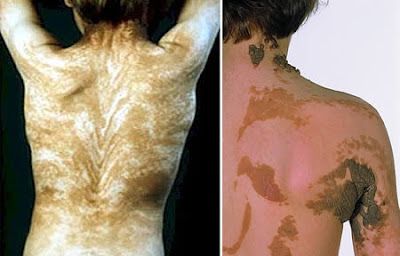
An extremely rare and unexplained phenomenon of human anatomy, Blaschko's lines were first presented in 1901 by German dermatologist Alfred Blaschko. Neither a specific disease nor a predictable symptom of a disease, Blaschko's lines are an invisible pattern built into human DNA. Many inherited and acquired diseases of the skin or mucosa manifest themselves according to these patterns, creating the visual appearance of stripes. The cause of the stripes is thought to result from mosaicism; they do not correspond to nervous, muscular, or lymphatic systems. What makes them more remarkable is that they correspond quite closely from patient to patient, usually forming a "V" shape over the spine and "S" shapes over the chest, stomach, and sides.
Argyria: Blue Skin, a real-life Smurf
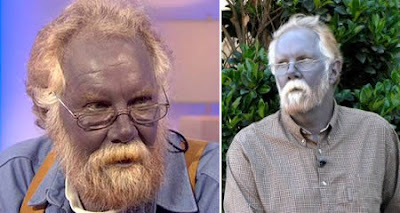
A condition caused by the ingestion of silver, the Argyria's most dramatic symptom is that the skin becomes blue or bluish-grey colored. On 2008, ABC reporters interviewed Paul Karason, 40 year-old who's skin turned blue after he used colloidal silver to ease his ailments. It started a decade ago, when he saw an ad in a new-age magazine promising health and rejuvenation through colloidal silver. Karason sent away for a kit for making colloidal silver -- a home brew of microscopic silver particles suspended in water. For a while, he was drinking at least 10 ounces a day as a cure for arthritis. "I had arthritis in my shoulders so bad I couldn't pull a T-shirt off. And the next thing I knew, it was just gone." he explained the media, but these claims have no basis in science and after a couple of months, his whole skin turned blue. "I kind of hoped it would fade off!" But it didn't fade off. Argyria is permanent.
Dermatographia: overly sensitive skin
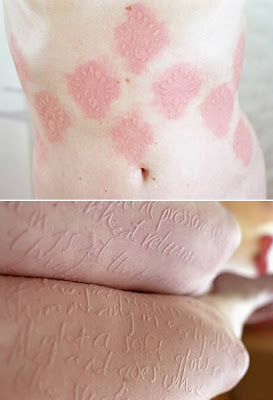
Dermatographia is a rare condition where the skin is overly sensitive to minor injuries; even light scratches will cause it to become red and raised. The person's immune system exhibits hypersensitivity, via skin, that releases excessive amounts of histamine, causing capillaries to dilate and welts to appear (lasting about thirty minutes) when the skin’s surface is lightly scratched. In 2008, Neatorama featured artist Ariana Page Russell, who decided to use her medical condition as the basis for art, with some amazing results.
Human Pappiloma Virus: meet the Tree Man
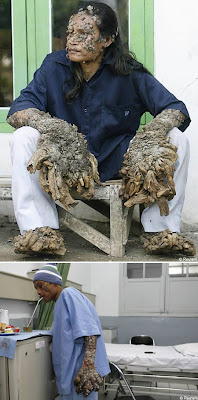
After a severe Human Pappiloma Virus (HPV) infection, Dede Koswara, a 35-year-old Indonesian fisherman, was dubbed the "tree man" because of the gnarled warts all over his body. He first noticed the warts on his body after cutting his knee as a teenager. Over time, Dede was sacked from his job, deserted by his wife and shunned by neighbours as the horn-like extensions covered much of his body and stopped him working. He has two children. After his case received widespread publicity, donations from the public and government help allowed him to get treatment, and in 2008, six kilos of warts were surgically removed from his body.
Tungiasis: fleas burrow into the skin and lay eggs
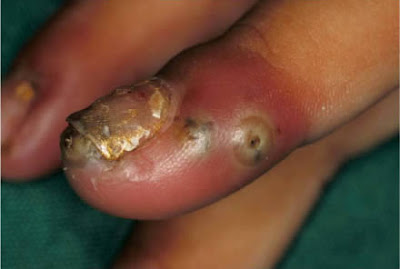
Tungiasis is a skin infestation of the Tunga penetrans flea, found in the tropical parts of Africa, Caribbean, Central and South America, and India. This fleas burrow into the skin and lay eggs, creating a disease which is actually endemic in Nigeria and Trinidad and Tobago, where in the 1980s the prevalence of tungiasis among children approached 40%.
Vitiligo: white patched skin
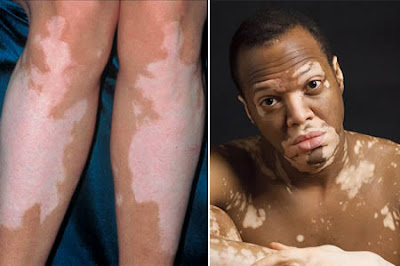
Vitiligo is a skin condition where the cells that make the pigment in your skin, the melanocytes, get destroyed. This causes white patches to appear on your skin, and this disease may affect any area of skin. These patches also show up on your mucous membranes and the retina of your eyes. Symptoms include white or gray hair on the patches, as well as the white patches on your skin, mucous membranes, and eyes. The precise cause of vitiligo is complex and not fully understood. There is some evidence suggesting it is caused by a combination of auto-immune, genetic, and environmental factors. The population incidence worldwide is considered to be between 1% and 2%.
Hypertrichosis: the Human Werewolf Syndrome
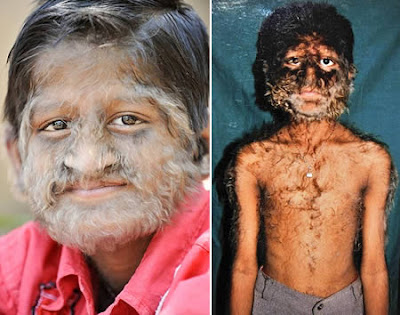
Hypertrichosis is a medical condition that causes excessive growth of hair in areas where hair does not normally grow. It may be present over the entire body, or you could have it in only one or more areas. Some individuals will be born with the condition and others will develop it later on in life. Congenital Hypertrichosis is very rare. In fact, it is so rare that there have been only 50 verified cases since the Middle Ages. On 2008, the press interviewed Pruthviraj Patil, an 11-year-old indian boy who's face and body are covered with hair. He rarely leaves his home village in India because of the cruelty of strangers. Pruthviraj’s family has tried homeopathy, traditional Indian Ayurvedic remedies even laser surgery without success, and he's now appealing to doctors to help him find a permanent cure since even after laser treatment the hair grows back.
Tags:
No comments:
Post a Comment